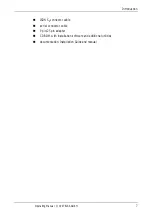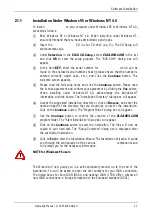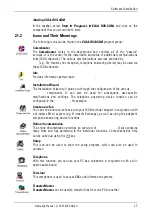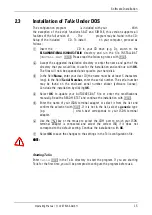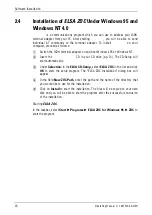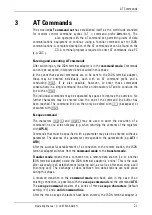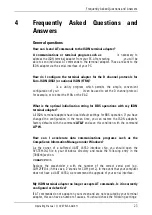
AT Commands
ELSA TanGo 1000
Operating Manual © 1997 ELSA GmbH
21
3 AT Commands
The so-called
AT command set
has established itself as the worldwide standard
for modem control command syntax (AT = command prefix
At
tention). The
ELSA
TanGo 1000
also operates with the AT command set, permitting users of data
communications equipment to continue using a familiar command set for ISDN
communications. A complete description of the AT command set can be found on the
ELSA TanGo 1000
CD. A terminal program is required to enter AT commands via a PC
(e.g. ZOC
).
Entering and executing AT commands
After switching on, the ISDN terminal adapter is in the
command mode
. Commands
can only be accepted, interpreted and executed in this phase.
In the event that several commands are to be sent to the ISDN terminal adapter,
these may be entered individually, each with an AT command prefix and a
concluding
M
. It is also possible, however, to enter these commands
consecutively in a single command line after an introductory AT and to conclude the
line with an
M
.
The individual commands may be separated by spaces to improve the overview. No
further characters may be entered once the end of the command line buffer has
been reached. The command line can then only be edited with
R
(backspace) or
executed with
M
.
Escape command
The characters
S
-
x
and
S
-
c
may be used to abort the execution of a
command line or a screen display (e.g. when returning the contents of the registers
with
AT%R
).
Commands that must be specified with a parameter may also be entered without a
parameter. The absence of a parameter corresponds to the parameter
0
(e.g.
ATI
=
ATI0
).
After the successful establishment of a connection to the remote station, the ISDN
terminal adapter switches from the
command mode
to the
transfer mode
.
Transfer mode
means that a connection to a remote data station (i.e. to another
ISDN terminal adapter) exists: the ISDN terminal adapter is 'online'. This is the case
after successful call establishment (outgoing call), as well as after answering a call
(incoming call). The exchange of data between two data stations can take place
during this phase.
A renewed transition to the
command mode
and back, also in the case of an
existing connection, is possible with the
escape command
and the command
ATO
.
The
escape command
consists of a series of three
escape characters
(default
setting: +++) and a
valid command line
.
After the three escape characters have been entered, the ISDN terminal adapter is
Summary of Contents for TanGo 1000
Page 1: ...ELSA TanGo 1000 User Manual ...
Page 6: ...Table of Contents 4 ELSA TanGo 1000 Operating Manual 1997 ELSA GmbH ...
Page 10: ...Introduction 8 ELSA TanGo 1000 Operating Manual 1997 ELSA GmbH Notes ...
Page 22: ...Software Installation 20 ELSA TanGo 1000 Operating Manual 1997 ELSA GmbH Notes ...

